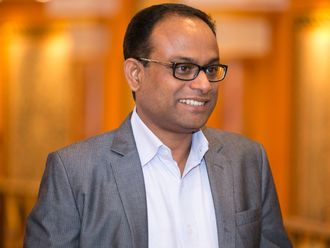
Abu Dhabi: "Renewable energy is not an alternative to fossil fuels. There is not a stark choice between the one and the other," Abdullah Al Attiyah, Qatar's Deputy Prime Minister and Minister of Energy, said yesterday as he appealed for more cooperation and less "them-and-us" dialogue.
He caught the mood of the room at the plenary session of the first day of the World Future Energy Summit, WFES, in Abu Dhabi. All delegates spoke of the urgency in increasing the use of renewable fuels and reducing the dependence on hydrocarbons, even if they differed on how to deal with the problem.
The discussions, in many meetings all over the sprawling summit, focused on the importance of renewable energies for two separate factors — reducing global warming and meeting the expected increased energy demand due to population growth.
Many ministers and delegates had been at the Copenhagen Summit, which set some global guidelines but failed to establish a legal treaty.
Divide
Some, like Ed Milliband, Britain's Energy Secretary, took the line that something was better than nothing, and he appealed to more countries to sign up to the Copenhagen Accord, while others like Mohammad Najib, the Malaysian Prime Minister, dismissed the Copenhagen Summit as a failure, which emphasised the divide between the developed and developing countries.
Most discussions looked at how to invest in renewable energy technology and enable the technology to spread quickly, so that it becomes a viable and substantial source of power, which can run alongside the existing reliance on fossil fuel.
Young Kim, Korean Minister of Knowledge Economy, described how Korea's energy sources today are 84 per cent fossil fuels, 14 per cent nuclear, and two per cent renewable. He indicated that Korea is planning to move to 50 per cent renewable-sourced energy by 2050.
The challenge facing this kind of investment in growing renewable energy was summed up eloquently by an Aramco engineer from Saudi Arabia who explained to Gulf News how the cheap cost of power from hydrocarbons gives them a huge advantage over other sources.
He said that in 1997 it cost $100 to produce a kilowatt hour of power from solar sources, and the huge development in solar power has reduced that prohibitive cost to close to $1.75 today.
Even so, oil-based fuel costs less by a further factor of 100, at between $0.03 to $0.07. This is in part due to the high energy produced from hydrocarbons, but also to more than 100 years of investment the entire world has focused on oil-based technologies.
But discussions at WFES focused on why this challenge has to be met.
As Mohammad Najib pointed out, the world expects a 40 per cent growth in energy demand from today till 2030, mostly from non-OECD countries. This cannot be met from oil since there is not enough, but it will run out in time anyway.
Smaller sources
Renewable energies will force a major change on how power will be delivered, since it will come from many smaller sources, scattered around a region, often at a domestic of business level. This means that the huge centralised power generating stations and country-wide grids that are the heart of the present energy systems will become less important.
Hélène Pellosse, Director General of The International Renewable Energy Agency, or Irena, spoke of the importance of this democratisation of power in her address to WFES, which challenged many of the traditional assumptions of how power is seen.
"Energy has always been centralised, but now it will be decentralised. A home has always been seen as a consumer of power, but now it will be a power plant," she said
"We cannot rely on the energy of the past to power our future," said Pellosse as she spoke of the immediate urgency of moving away from fossil fuel and switching to renewable sources, which will both meet increased demand, but also help stop the vital danger to the human race of global warming.











